- Home
- Patricia Highsmith
The Talented Mr. Ripley Page 3
The Talented Mr. Ripley Read online
Page 3
“That’d be fine.” It began to sound exciting to him.
“You’ll have to catch a bus from Naples to Richard’s village. I’ll write him about you—not telling him that you’re an emissary from me,” he added, smiling, “but I’ll tell him we’ve met. Richard ought to put you up, but if he can’t for some reason, there’re hotels in the town. I expect you and Richard’ll hit it off all right. Now as to money—” Mr. Greenleaf smiled his fatherly smile. “I propose to give you six hundred dollars in traveler’s checks apart from your round-trip ticket. Does that suit you? The six hundred should see you through nearly two months, and if you need more, all you have to do is wire me, my boy. You don’t look like a young man who’d throw money down the drain.”
“That sounds ample, sir.”
Mr. Greenleaf got increasingly mellow and jolly on the brandy, and Tom got increasingly close-mouthed and sour. Tom wanted to get out of the apartment. And yet he still wanted to go to Europe, and wanted Mr. Greenleaf to approve of him. The moments on the sofa were more agonizing than the moments in the bar last night when he had been so bored, because now that break into another gear didn’t come. Several times Tom got up with his drink and strolled to the fireplace and back, and when he looked into the mirror he saw that his mouth was turned down at the corners.
Mr. Greenleaf was rollicking on about Richard and himself in Paris, when Richard had been ten years old. It was not in the least interesting. If anything happened with the police in the next ten days, Tom thought, Mr. Greenleaf would take him in. He could tell Mr. Greenleaf that he’d sublet his apartment in a hurry, or something like that, and simply hide out here. Tom felt awful, almost physically ill.
“Mr Greenleaf, I think I should be going.”
“Now? But I wanted to show you— Well, never mind. Another time.”
Tom knew he should have asked, “Show me what?” and been patient while he was shown whatever it was, but he couldn’t.
“I want you to visit the yards, of course!” Mr. Greenleaf said cheerfully. “When can you come out? Only during your lunch hour, I suppose. I think you should be able to tell Richard what the yards look like these days.”
“Yes—I could come in my lunch hour.”
“Give me a call any day, Tom. You’ve got my card with my private number. If you give me half an hour’s notice, I’ll have a man pick you up at your office and drive you out. We’ll have a sandwich as we walk through, and he’ll drive you back.”
“I’ll call you,” Tom said. He felt he would faint if he stayed one minute longer in the dimly lighted foyer, but Mr. Greenleaf was chuckling again, asking him if he had read a certain book by Henry James.
“I’m sorry to say I haven’t, sir, not that one,” Tom said.
“Well, no matter.” Mr. Greenleaf smiled.
Then they shook hands, a long suffocating squeeze from Mr. Greenleaf, and it was over. But the pained, frightened expression was still on his face as he rode down in the elevator, Tom saw. He leaned in the corner of the elevator in an exhausted way, though he knew as soon as he hit the lobby he would fly out of the door and keep on running, running, all the way home.
4
The atmosphere of the city became stranger as the days went on. It was as if something had gone out of New York—the realness or the importance of it—and the city was putting on a show just for him, a colossal show with its buses, taxis, and hurrying people on the sidewalks, its television shows in all the Third Avenue bars, its movie marquees lighted up in broad daylight, and its sound effects of thousands of honking horns and human voices, talking for no purpose whatsoever. As if when his boat left the pier on Saturday, the whole city of New York would collapse with a poof like a lot of cardboard on a stage.
Or maybe he was afraid. He hated water. He had never been anywhere before on water, except to New Orleans from New York and back to New York again, but then he had been working on a banana boat mostly below deck, and he had hardly realized he was on water. The few times he had been on deck the sight of the water had at first frightened him, then made him feel sick, and he had always run below deck again, where, contrary to what people said, he had felt better. His parents had drowned in Boston Harbor, and Tom had always thought that probably had something to do with it, because as long as he could remember he had been afraid of water, and he had never learned how to swim. It gave Tom a sick, empty feeling at the pit of his stomach to think that in less than a week he would have water below him, miles deep, and that undoubtedly he would have to look at it most of the time, because people on ocean liners spent most of their time on deck. And it was particularly un-chic to be seasick, he felt. He had never been seasick, but he came very near it several times in those last days, simply thinking about the voyage to Cherbourg.
He had told Bob Delancey that he was moving in a week, but he hadn’t said where. Bob did not seem interested, anyway. They saw very little of each other at the Fifty-first Street place. Tom had gone to Marc Priminger’s house in East Forty-fifth Street—he still had the keys—to pick up a couple of things he had forgotten, and he had gone at an hour when he had thought Marc wouldn’t be there, but Marc had come in with his new housemate, Joel, a thin drip of a young man who worked for a publishing house, and Marc had put on one of his suave “Please-do-just-as-you-like” acts for Joel’s benefit, though if Joel hadn’t been there Marc would have cursed him out in language that even a Portuguese sailor wouldn’t have used. Marc (his given name was, of all things, Marcellus) was an ugly mug of a man with a private income and a hobby of helping out young men in temporary financial difficulties by putting them up in his two-story, three-bedroom house, and playing God by telling them what they could and couldn’t do around the place and by giving them advice as to their lives and their jobs, generally rotten advice. Tom had stayed there three months, though for nearly half that time Marc had been in Florida and he had had the house all to himself, but when Marc had come back he had made a big stink about a few pieces of broken glassware—Marc playing God again, the Stern Father—and Tom had gotten angry enough, for once, to stand up for himself and talk to him back. Whereupon Marc had thrown him out, after collecting sixty-three dollars from him for the broken glassware. The old tightwad! He should have been an old maid, Tom thought, at the head of a girls’ school. Tom was bitterly sorry he had ever laid eyes on Marc Priminger, and the sooner he could forget Marc’s stupid, piglike eyes, his massive jaw, his ugly hands with the gaudy rings (waving through the air, ordering this and that from everybody), the happier he would be.
The only one of his friends he felt like telling about his European trip was Cleo, and he went to see her on the Thursday before he sailed. Cleo Dobelle was a tall, slim dark-haired girl who could have been anything from twenty-three to thirty, Tom didn’t know, who lived with her parents in Gracie Square and painted in a small way—a very small way, in fact, on little pieces of ivory no bigger than postage stamps that had to be viewed through a magnifying glass, and Cleo used a magnifying glass when she painted them. “But think how convenient it is to be able to carry all my paintings in a cigar box! Other painters have to have rooms and rooms to hold their canvases!” Cleo said. Cleo lived in her own suite of rooms with a little bath and kitchen at the back of her parents’ section of the apartment, and Cleo’s apartment was always rather dark since it had no exposure except to a tiny backyard overgrown with ailanthus trees that blocked out the light. Cleo always had the lights on, dim ones, which gave a nocturnal atmosphere whatever the time of day. Except for the night when he had met her, Tom had seen Cleo only in close-fitting velvet slacks of various colors and gaily striped silk shirts. They had taken to each other from the very first night, when Cleo had asked him to dinner at her apartment on the following evening. Cleo always asked him up to her apartment, and there was somehow never any thought that he might ask her out to dinner or the theater or do any of the ordinary things that a young man was expected to do with a girl. She didn’t expect him to bring her flowers or boo
ks or candy when he came for dinner or cocktails, though Tom did bring her a little gift sometimes, because it pleased her so. Cleo was the one person he could tell that he was going to Europe and why. He did.
Cleo was enthralled, as he had known she would be. Her red lips parted in her long, pale face, and she brought her hands down on her velvet thighs and exclaimed, “Tom-mie! How too, too marvelous! It’s just like out of Shakespeare or something!”
That was just what Tom thought, too. That was just what he had needed someone to say.
Cleo fussed around him all evening, asking him if he had this and that, Kleenexes and cold tablets and woolen socks because it started raining in Europe in the fall, and his vaccinations. Tom said he felt pretty well prepared.
“Just don’t come to see me off, Cleo. I don’t want to be seen off.”
“Of course not!” Cleo said, understanding perfectly. “Oh, Tommie, I think that’s such fun! Will you write me everything that happens with Dickie? You’re the only person I know who ever went to Europe for a reason.”
He told her about visiting Mr. Greenleaf’s shipyards in Long Island, the miles and miles of tables with machines making shiny metal parts, varnishing and polishing wood, the drydocks with boat skeletons of all sizes, and impressed her with the terms Mr. Greenleaf had used—coamings, inwales, keelsons, and chines. He described the second dinner at Mr. Greenleaf’s house, when Mr. Greenleaf had presented him with a wristwatch. He showed the wristwatch to Cleo, not a fabulously expensive wristwatch, but still an excellent one and just the style Tom might have chosen for himself—a plain white face with fine black Roman numerals in a simple gold setting with an alligator strap.
“Just because I happened to say a few days before that I didn’t own a watch,” Tom said. “He’s really adopted me like a son.” And Cleo, too, was the only person he knew to whom he could say that.
Cleo sighed. “Men! You have all the luck. Nothing like that could ever happen to a girl. Men’re so free!”
Tom smiled. It often seemed to him that it was the other way around. “Is that the lamb chops burning?”
Cleo jumped up with a shriek.
After dinner, she showed him five or six of her latest paintings, a couple of romantic portraits of a young man they both knew, in an open-collared white shirt, three imaginary landscapes of a junglelike land, derived from the view of ailanthus trees out her window. The hair of the little monkeys in the paintings was really astoundingly well done, Tom thought. Cleo had a lot of brushes with just one hair in them, and even these varied from comparatively coarse to ultrafine. They drank nearly two bottles of Medoc from her parents’ liquor shelf, and Tom got so sleepy he could have spent the night right where he was lying on the floor—they had often slept side by side on the two big bear rugs in front of the fireplace, and it was another of the wonderful things about Cleo that she never wanted or expected him to make a pass at her, and he never had—but Tom hauled himself up at a quarter to twelve and took his leave.
“I won’t see you again, will I?” Cleo said dejectedly at the door.
“Oh, I should be back in about six weeks,” Tom said, though he didn’t think so at all. Suddenly he leaned forward and planted a firm, brotherly kiss on her ivory cheek. “I’ll miss you, Cleo.”
She squeezed his shoulder, the only physical touch he could recall her ever having given him. “I’ll miss you,” she said.
The next day he took care of Mrs. Greenleaf’s commissions at Brooks Brothers, the dozen pairs of black woolen socks and the bathrobe. Mrs. Greenleaf had not suggested a color for the bathrobe. She would leave that up to him, she had said. Tom chose a dark maroon flannel with a navy-blue belt and lapels. It was not the best-looking robe of the lot, in Tom’s opinion, but he felt it was exactly what Richard would have chosen, and that Richard would be delighted with it. He put the socks and the robe on the Greenleafs’ charge account. He saw a heavy linen sport shirt with wooden buttons that he liked very much, that would have been easy to put on the Greenleafs’ account, too, but he didn’t. He bought it with his own money.
5
The morning of his sailing, the morning he had looked forward to with such buoyant excitement, got off to a hideous start. Tom followed the steward to his cabin congratulating himself that his firmness with Bob about not wanting to be seen off had taken effect, and had just entered the room when a bloodcurdling whoop went up.
“Where’s all the champagne, Tom? We’re waiting!”
“Boy, is this a stinking room! Why don’t you ask them for something decent?”
“Tommie, take me?” from Ed Martin’s girlfriend, whom Tom couldn’t bear to look at.
There they all were, mostly Bob’s lousy friends, sprawled on his bed, on the floor, everywhere. Bob had found out he was sailing, but Tom had never thought he would do a thing like this. It took self-control for Tom not to say in an icy voice, “There isn’t any champagne.” He tried to greet them all, tried to smile, though he could have burst into tears like a child. He gave Bob a long, withering look, but Bob was already high, on something. There were very few things that got under his skin, Tom thought self-justifyingly, but this was one of them: noisy surprises like this, the riffraff, the vulgarians, the slobs he had thought he had left behind when he crossed the gangplank, littering the very stateroom where he was to spend the next five days!
Tom went over to Paul Hubbard, the only respectable person in the room, and sat down beside him on the short, built-in sofa. “Hello, Paul,” he said quietly. “I’m sorry about all this.”
“Oh!” Paul scoffed. “How long’ll you be gone?— What’s the matter, Tom? Are you sick?”
It was awful. It went on, the noise and the laughter and the girls feeling the bed and looking in the john. Thank God the Greenleafs hadn’t come to see him off! Mr. Greenleaf had had to go to New Orleans on business, and Mrs. Greenleaf, when Tom had called this morning to say good-bye, had said that she didn’t feel quite up to coming down to the boat.
Finally, Bob or somebody produced a bottle of whiskey, and they all began to drink out of the two glasses from the bathroom, and then a steward came in with a tray of glasses. Tom refused to have a drink. He was sweating so heavily, he took off his jacket so as not to soil it. Bob came over and rammed a glass in his hand, and Bob was not exactly joking, Tom saw, and he knew why—because he had accepted Bob’s hospitality for a month, and he might at least put on a pleasant face, but Tom could not put on a pleasant face any more than if his face had been made of granite. So what if they all hated him after this, he thought, what had he lost?
“I can fit in here, Tommie,” said the girl who was determined to fit in somewhere and go with him. She had wedged herself sideways into a narrow closet about the size of a broom closet.
“I’d like to see Tom caught with a girl in his room!” Ed Martin said, laughing.
Tom glared at him. “Let’s get out of here and get some air,” he murmured to Paul.
The others were making so much noise, nobody noticed their leaving. They stood at the rail near the stern. It was a sunless day, and the city on their right was already like some gray, distant land that he might be looking at from mid-ocean—except for those bastards inside his stateroom.
“Where’ve you been keeping yourself?” Paul asked. “Ed called up to tell me you were leaving. I haven’t seen you in weeks.”
Paul was one of the people who thought he worked for the Associated Press. Tom made up a fine story about an assignment he had been sent on. Possibly the Middle East, Tom said. He made it sound rather secret. “I’ve been doing quite a lot of night work lately, too,” Tom said, “which is why I haven’t been around much. It’s awfully nice of you to come down and see me off.”
“I hadn’t any classes this morning,” Paul took the pipe out of his mouth and smiled. “Not that I wouldn’t have come anyway, probably. Any old excuse!”
Tom smiled. Paul taught music at a girls’ school in New York to earn his living, but he preferred to com
pose music on his own time. Tom could not remember how he had met Paul, but he remembered going to his Riverside Drive apartment for Sunday brunch once with some other people, and Paul had played some of his own compositions on the piano, and Tom had enjoyed it immensely. “Can’t I offer you a drink? Let’s see if we can find the bar,” Tom said.
But just then a steward came out, hitting a gong and shouting, “Visitors ashore, please! All visitors ashore!”
“That’s me,” Paul said.
They shook hands, patted shoulders, promised to write postcards to each other. Then Paul was gone.
Bob’s gang would stay till the last minute, he thought, probably have to be blasted out. Tom turned suddenly and ran up a narrow, ladderlike flight of stairs. At the top of it he was confronted by a cabin class only sign hanging from a chain, but he threw a leg over the chain and stepped on to the deck. They surely wouldn’t object to a first-class passenger going into second-class, he thought. He couldn’t bear to look at Bob’s gang again. He had paid Bob half a month’s rent and given him a good-bye present of a good shirt and tie. What more did Bob want?
The ship was moving before Tom dared to go down to his room again. He went into the room cautiously. Empty. The neat blue bedcover was smooth again. The ashtrays were clean. There was no sign they had ever been here. Tom relaxed and smiled. This was service! The fine old tradition of the Cunard Line, British seamanship and all that! He saw a big basket of fruit on the floor by his bed. He seized the little white envelope eagerly. The card inside said:
Bon voyage and bless you, Tom. All our good wishes go with you.
Emily and Herbert Greenleaf
The basket had a tall handle and it was entirely under yellow cellophane—apples and pears and grapes and a couple of candy bars and several little bottles of liqueurs. Tom had never received a bon voyage basket. To him, they had always been something you saw in florists’ windows for fantastic prices and laughed at. Now he found himself with tears in his eyes, and he put his face down in his hands suddenly and began to sob.

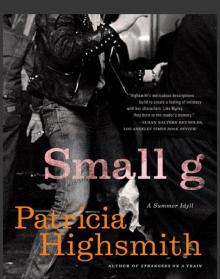 Small G: A Summer Idyll
Small G: A Summer Idyll The Boy Who Followed Ripley
The Boy Who Followed Ripley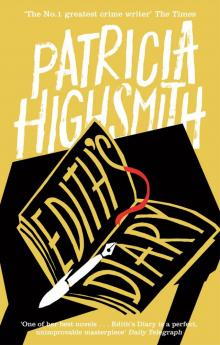 Edith's Diary
Edith's Diary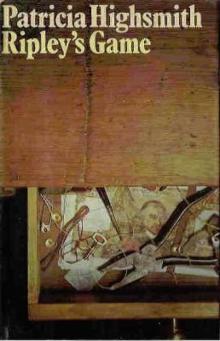 Ripley's Game
Ripley's Game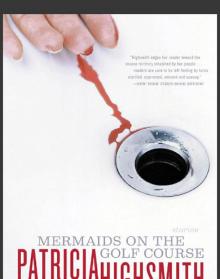 Mermaids on the Golf Course: Stories
Mermaids on the Golf Course: Stories Slowly, Slowly in the Wind
Slowly, Slowly in the Wind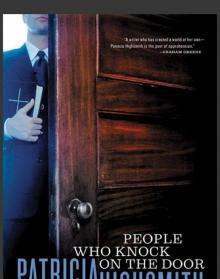 People Who Knock on the Door
People Who Knock on the Door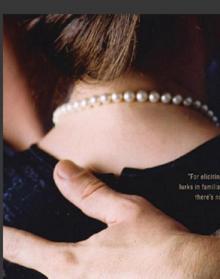 The Glass Cell
The Glass Cell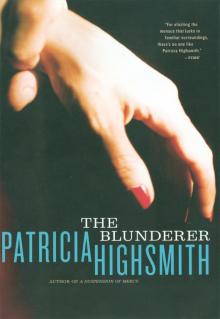 The Blunderer
The Blunderer Those Who Walk Away
Those Who Walk Away A Suspension of Mercy
A Suspension of Mercy Eleven
Eleven Found in the Street
Found in the Street Ripley Under Ground
Ripley Under Ground The Black House
The Black House The Cry of the Owl
The Cry of the Owl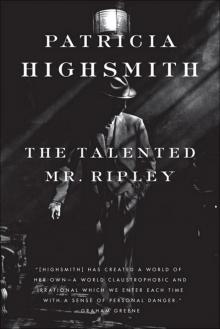 The Talented Mr. Ripley
The Talented Mr. Ripley This Sweet Sickness
This Sweet Sickness The Two Faces of January
The Two Faces of January The Animal-Lover's Book of Beastly Murder
The Animal-Lover's Book of Beastly Murder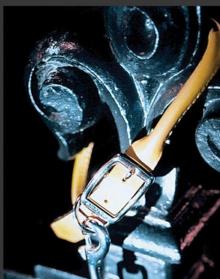 A Dog's Ransom
A Dog's Ransom Deep Water
Deep Water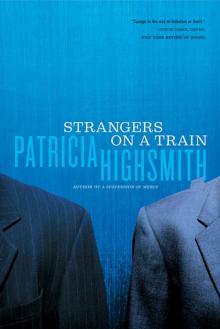 Strangers on a Train
Strangers on a Train Ripley Under Water
Ripley Under Water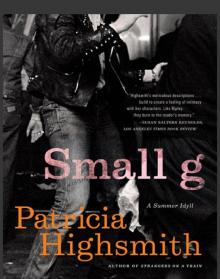 Small g
Small g Nothing That Meets the Eye
Nothing That Meets the Eye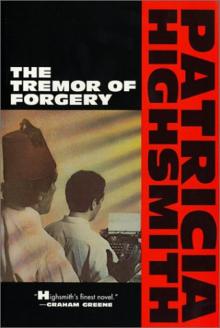 Patricia Highsmith - The Tremor of Forgery
Patricia Highsmith - The Tremor of Forgery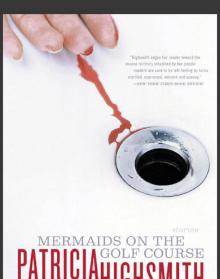 Mermaids on the Golf Course
Mermaids on the Golf Course Suspension of Mercy
Suspension of Mercy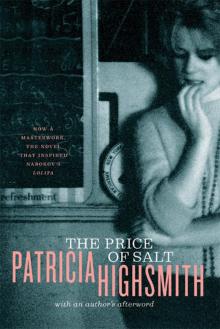 The Price of Salt, or Carol
The Price of Salt, or Carol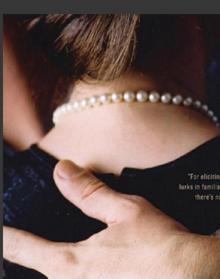 Glass Cell
Glass Cell